Previously on Drokk!: We’ve just finished “Necropolis,” in which John Wagner regained the mojo temporarily lost when he and Alan Grant ended their writing partnership — which makes it the perfect time to go back and revisit that partnership one more time*, don’t you think?

0:00:00-0:02:21: In which I use the cold open Jeff really didn’t think I would, and we introduce the book we’re reading this episode: Judge Dredd: The Restricted Files Vol. 2, which collects Dredd shorts from various special issues and annuals published between 1985 and 1989. It’s a mixed bag, but not a bad one, especially if you stop reading before the end.
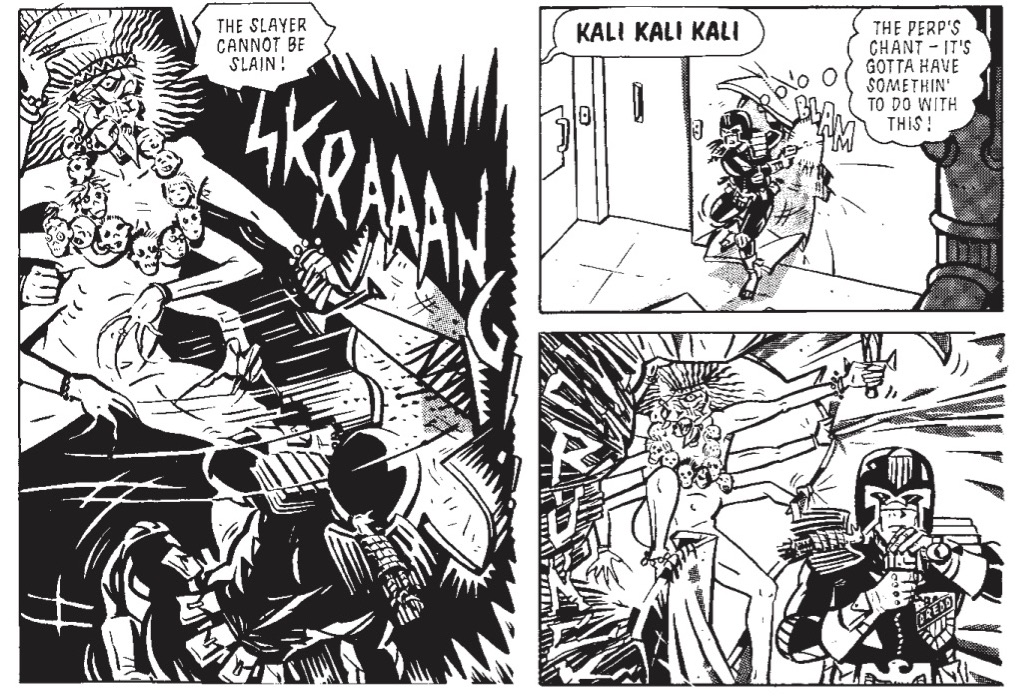
0:02:22-0:16:43: In fact, the drop-off in quality is something we discuss relatively early on, bringing up two stories in particular that disappointed, both of which are written by Grant and Wagner separately, as opposed to collaboratively. But the collaborative stuff, we decide, is the comic book equivalent of comfort food, which leads to a brief discussion of the joy of the Wagner/Grant team.
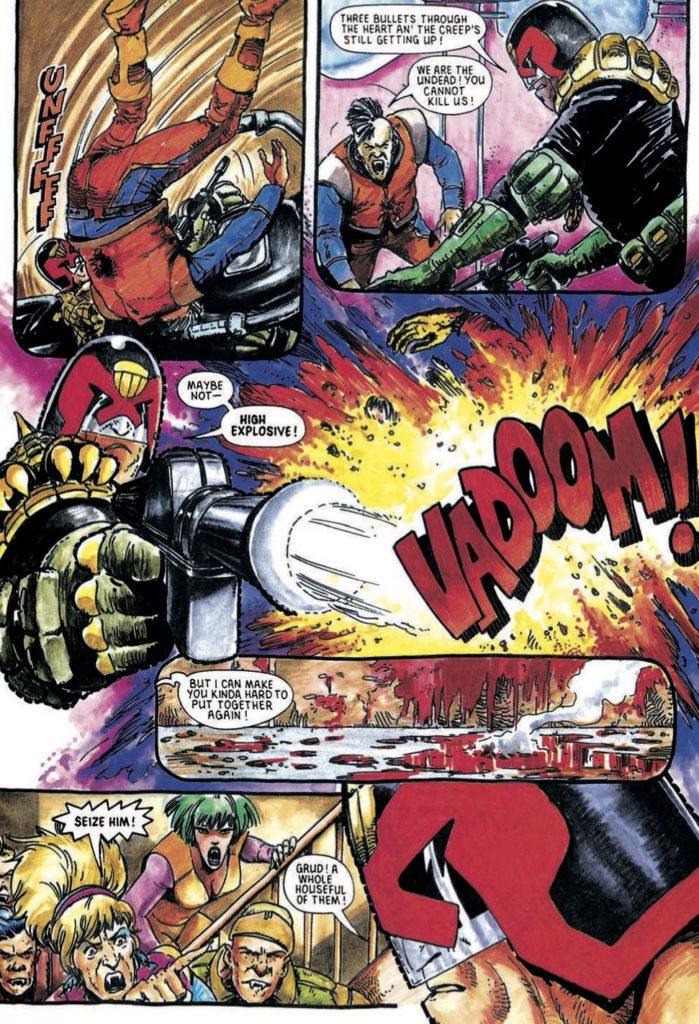
0:16:44-0:24:38: By way of comparing the strengths of the Wagner/Grant team and their solo work in this book, we talk about one of our favorite stories in this collection, “Costa Del Blood,” and the ways in which it just… works, despite all these tricky things that should be hard to pull off properly: Comedy! Pop culture references! Metatextuality! And yet, it looks effortless — but perhaps that’s the amazing Carlos Ezquerra artwork fooling us. Not so good? That would be “Confessions of an Anarchist Flea,” for reasons we briefly go into.
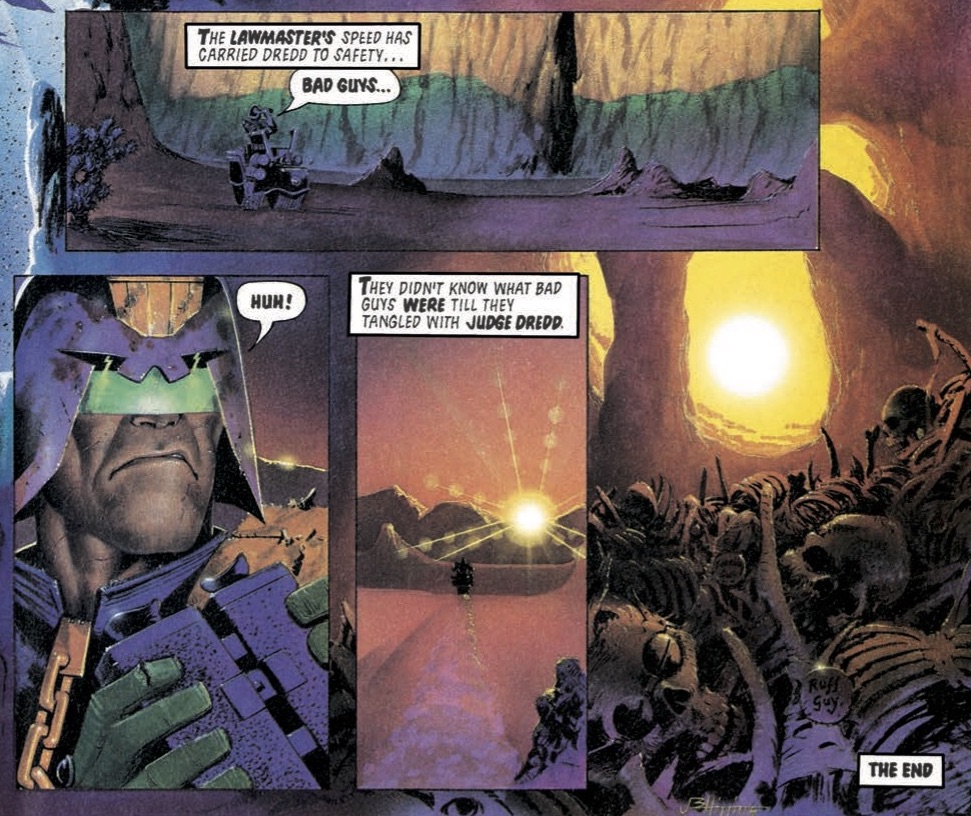
0:24:39-0:58:24: What are our favorite stories from the book? Those would be “Costa Del Blood,” and, for Jeff, “Beyond the Wall” and “Last of the Bad Guys.” For me, I add “Crazy R Raiders” and “I, Beast.” We talk about all five, as well as a host of other topics — how well Wagner and Grant use the format and real estate of these stories, the way they recycle ideas even within the stories just in this volume (Hi, “Macho” men), and the purpose of the stories reprinted in this book, versus the regular Dredds in the weekly. Jeff wonders if these are stories intended to spotlight artists, and we take a short detour into the concept of breaking Dredd as a comic strip, and just how possible that actually is. Look, it’s half an hour of conversation; we have a lot to talk about.
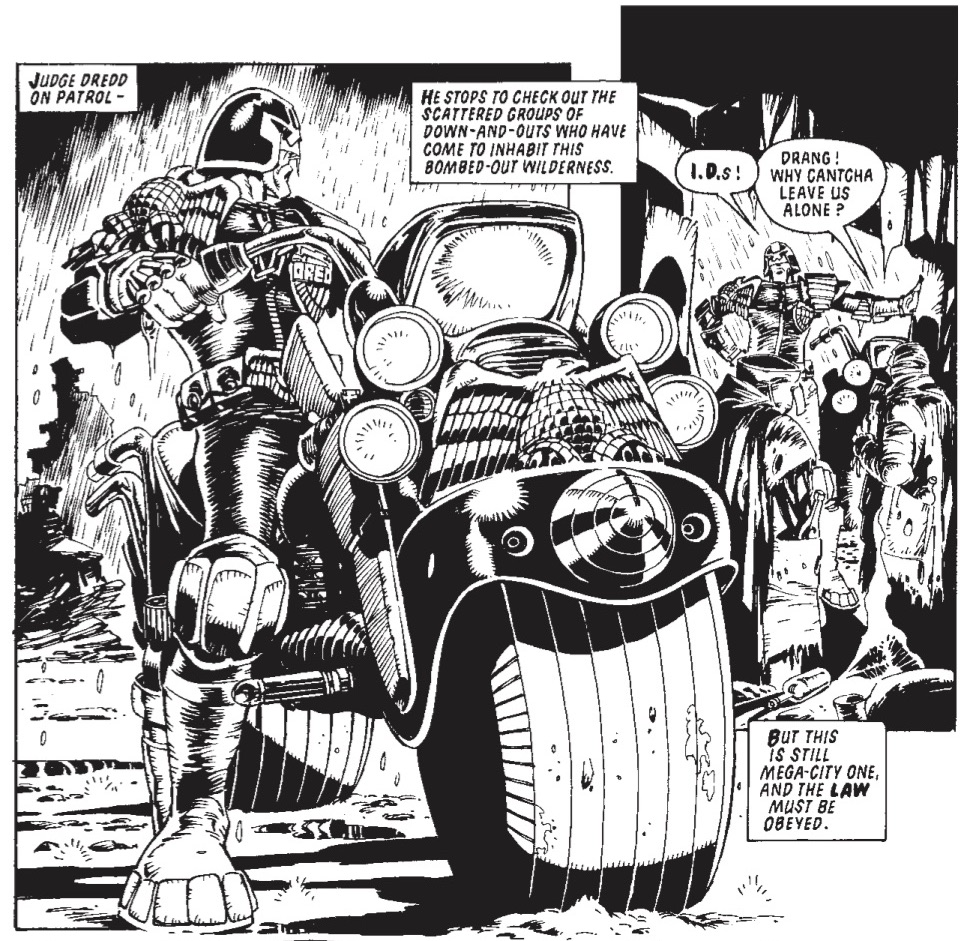
0:58:25-1:04:04: There’s a lot to love about Restricted 2, despite our reservations, and we talk about the fact that it’s an embarrassment of riches in terms of both writing and art, and Jeff brings up a strange piece of Dredd ephemera with relation to the Wagner/Grant split and how it plays out in two separate stories here.
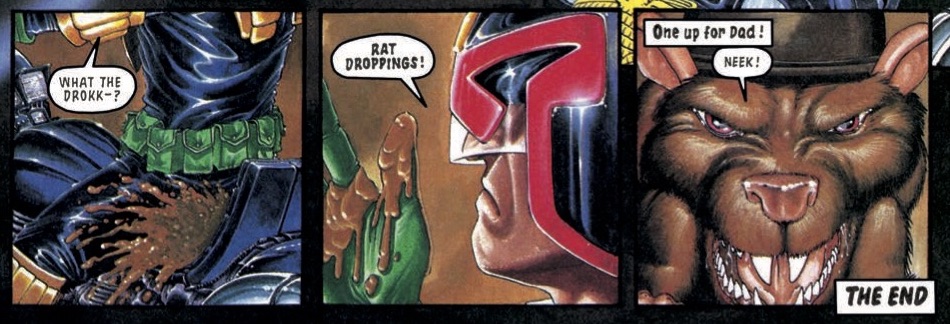
1:04:05-1:23:18: Having spent so long talking about what’s good, it’s clearly time to head into the worst stories, and we find agreement on the subject. Jeff’s not down with John Wagner not exposing his knowledge of Dungeons and Dragons, I’m embarrassed for Alan Grant’s musical references in “Headbangers,” and we’re both shocked by how bad the debut of the son of a psychopathic rodent can actually be. We also find a short while to discuss Wagner and Grant’s different approaches to ownership of the characters they’re writing, and wonder whether Alan Grant has a problem assigning any kind of emotion to authority figures in general.

1:23:19-end: It’s the end of the episode, but not before we tease (or is it dread) Case Files Vol. 15 next month and I have a question for everyone, and then there’s the usual mentions of the Tumblr, the Instagram, the Twitter and the Patreon. As ever, thank you for reading along and listening, Whatnauts.
(* There will be more times we’ll revisit the Wagner/Grant partnership. One of which will be happening quite soon, in fact…)


I think Vanyo was the creator Jeff mentioned as not being included in the biographies. It looks like they’re a team of two Spanish brothers and did a few Dredd stories you’ve already covered and one in the next volume of the Case Files. They didn’t seem to do that much work for 2000 ad.
Honoured esteemed hosts, you must do the Judge Dredd rewatch in June. I cannot become complete as a human being unless you do this. I implore you to do this. I approach on bended knee in abject supplication begging you to do this. Please, oh masters of the Wait What Universe, hear my plea.
As a bonus, we could then watch the 2012 Dredd film. Imagine all the possibilities to compare and contrast. The mind reels at the very thought if it.
Scattered thoughts:-
– The most important thing that our hosts said this episode was clearly when Graeme McMillan pointed out that this volume is evidence that there was a golden age of Dredd. Because the period that he pointed out, the years leading up to 1989 — that’s more-or-less “my” Dredd. And was the golden age of Dredd when *I* was most invested in it? Well, obviously. Goes without saying, really.
But more seriously, what was it that made that the golden age of Dredd. I think one answer might be because that was an era in transition, giving it a really appealing tension between silly and serious, and also because the British comics audience was in transition – that whole element of 2000 AD growing up, and the audience growing up with it.
But I wonder if all that also got a special energy from late-period Thatcherism, or more exactly penultimate-period Thatcherism – that pre-poll tax era up through 1989 when Thatcher seemed eternal and unshakeable.
Judge Dredd is a strip that gets away with an awful lot: the world doesn’t really make sense, it has very abrupt and discordant tonal shifts, and, obviously, it demands that you view a quite absurdly unsympathetic figure as the hero and then switch that neatly off when the story calls for you to switch that off (and then switch it back on again). And all that is part of what makes it great – Judge Dredd offers this double-vision in which one reads both ironically and deeply sincerely at the same time.
But how does it get away with all that? Part of the answer might be, for want of a better word, ambience. 2000 AD offered a unified and coherent feeling of being oppositional as an overall package, above the level of the individual story. To do that, it really helps to have something coherent to be against, and “There is no alternative” Thatcherism was ideally suited for that.
– I’d defend Blockers against our hosts’ criticism of the ending. I think the absence of closure is the point: it’s a shaggy-dog story about how there is no ending, about how the craziness of Mega-City One is endless and goes on and on. After all, its last words are the caption “Never the end.” I think the key thing for me is where the reveal that the nuclear bomb is a dud is placed. Bottom RH on the second-to-last page, deliberately not exploiting the page turn.
– One thing that’s striking when you see a bunch of stories spread out across a period all at once like this is how the “Comics can be for grown-ups” era is producing a pressure to write stories that are About something that is Important. Sometimes this can be endearingly ham-handed, as when the “Constitutional rights” line is thrown into a story that also works as a Judge Dredd story. Sometimes, as with the Gaia story (wow, we *are* in the ‘80s), the Aboutness of it all overwhelms anything else.
– The Citi-Def story is another instance when Judge Dredd is about British ideas about America and especially American pop culture. Note the way in which it links America’s gun culture to American celebration of macho military stereotypes, but also that it expresses a foreigner’s bewilderment at the problem existing at all.
-Kalamazoo. I see John Wagner has been getting his atlas out again to look for interesting American placenames.
Another great episode, and an unexpectedly surprisingly good volume of Dredd tales. I too had little hope for this volume. I can understand after “Necropolis” how this would feel like a letdown, but I enjoyed the classic Dredd feel to a lot of the strips here, not to mention the tour de force artwork on display.
The Cam Kennedy strip, “I, Beast,” also felt very familiar to the point that the deja vu sense was overwhelming. I half thought I had bought the wrong Case File by accident. So, I did some research, and I learned this story also appeared as the final strip in the Complete Case Files Vol. 10! We did not have a collective hallucination about this one. We all though we read it before because we *had* read it before.